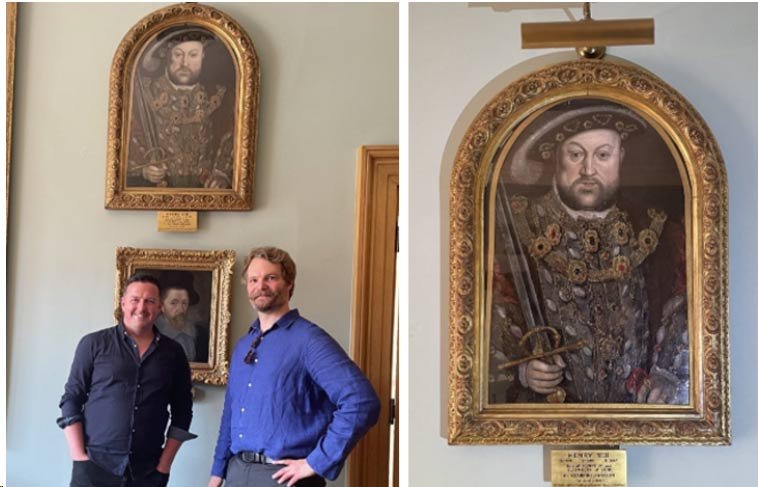Earlier this month, an art historian casually browsing X stumbled upon a post, shared by the British Crown’s representative in Warwickshire, featuring a reception at the local shire hall. In the background, next to a door marked by a neon exit sign, hung a long-lost portrait of the famed Tudor king, Henry VIII, encased in a frame topped by a distinctive rounded arch.
A Commission of European Royalty: It’s a Sheldon Series!
He immediately sensed that this was a lost and found likeness of Henry VIII, painted in the late 16th century as part of a collection of 22 portraits depicting various European royals, statesmen, and military leaders, as per a statement by Warwickshire City Council.
The British fine art researcher, Adam Busiakiewicz, a consultant at Sotheby’s, immediately decided to investigate further. Teaming up with Aaron Manning, a specialist at a royal palace outside central London, they examined the artwork in person. Their examination confirmed Busiakiewicz’s suspicion.
He was referring to a series of portraits commissioned in the 1590s by Ralph Sheldon, a local politician and tapestry-maker. These portraits were originally displayed at Weston House in Warwickshire. The arched tops of the portraits were designed to fit into an architectural frieze in the Long Gallery at Weston.
“Social media is a crazy thing,” Busiakiewicz tells CNN’s Lianne Kolirin, “because some people use it to watch cat videos and follow what’s going on in the world, and then people like me just look at what people have hanging on their walls.”
In a blog post earlier this month, Busiakiewicz explained that the arched top was a unique feature of the Sheldon set, and the frame of the Henry VIII portrait matched other surviving examples from the series. The painting depicted Henry VIII holding a sword and wearing a feathered hat, mirroring his appearance in an engraving of the Long Hall made by antiquarian Henry Shaw in 1839.
In a statement, Cllr Heather Timms, Warwickshire County Council Portfolio Holder for Environment, Climate and Culture, said:
“We are absolutely delighted to learn that one of the paintings displayed in Judges’ House at Shire Hall in Warwick could in fact be a historically significant piece. The King Henry VIII artwork has now been moved to our Museum Collections Centre where further research will take place, demonstrating that even in the present day there is still so much of our county’s rich and vibrant cultural heritage to discover.”
Eagle Eyed Historian: Establishing Provenance
The Sheldon portraits were later dispersed at auction, and most remain untraced. However, Busiakiewicz’s keen eye has brought one of them back into the spotlight. After visiting Warwick’s Shire Hall, they confirmed that the portrait’s size and style were consistent with the other Sheldon portraits. This isn’t the first time Busiakiewicz has made a significant discovery via social media. In 2018, he identified a portrait by 17th-century female artist Joan Carlile from a photo a friend had posted on Instagram, reports The Smithsonian Mag.
Following their visit, Busiakiewicz and Manning approached Warwickshire County Council about the painting. The council confirmed in an email to CNN that they had arranged for the art historians to examine the portrait. Busiakiewicz noted that the artist of the series is unknown, often referred to as The Sheldon Master.
“There are lots of Tudor corridor sets which were produced at the time. But I think the Sheldon set is important because it was probably the grandest. They are much larger than the standard corridor set. They are also, I think, much higher quality,” Busiakiewicz tells the London Times.
A plaque beneath the portrait reveals that the Warwickshire County Council acquired it from Madingley Hall, now part of the University of Cambridge, in 1951. At the time, it was attributed to an artist working in the style of Hans Holbein the Younger. The painting’s complete provenance, particularly its whereabouts between 1908 and 1951, remains unknown. Currently, Busiakiewicz is working to establish the painting’s provenance.
In an interview with BBC News’ Alice Cullinane, Busiakiewicz refrained from estimating the painting’s value but mentioned that similar works from the set have sold for approximately £200,000, or around $250,000.
Currently, the portrait has been relocated to a more secure location “for further evaluation and research into its history,” according to a statement. Councilors hope to eventually display this likeness alongside a portrait of Ralph Sheldon and his tapestry map of Warwickshire, both of which are presently exhibited at the Market Hall Museum in Warwick.
“Provenance is always such a really tricky thing – it’s very hard sometimes to find, particularly when pictures are sold privately. But there’s no doubt that this is Ralph Sheldon’s painting of Henry VIII. Looking at paintings and pictures of paintings is my life and it’s great fun, particularly when you can in some way right a historic wrong, let’s say. Pictures that are overlooked, pictures that aren’t appreciated as much as they might be,” he concludes.
Top image: Left; Aaron Manning and Adam Busiakiewicz, with the Henry VIII portrait, Right; The Henry VII portrait. Source: Courtesy of Adam Busiakiewicz








